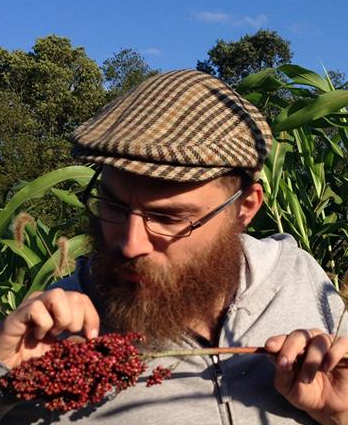Climate change– its causes and effects, its crusaders and its naysayers– is one of the top issues of our time. For Nate Kleinman, who used to work in disaster relief, it’s the work of his life. On February 24th, Living Web Farms will host Kleinman for a full day workshop on addressing climate change on the farm and in the garden, through the fostering of native plants, resilient plants, radical grassroots plant breeding, citizen research, and seed saving.
As a political organizer and activist working on hurricane relief in New Jersey after Sandy, Nate Kleinman made a connection that would change the course of his life. “It clicked for me that climate change and its effects are a social justice issue. And social justice is something I had always been passionate about. Disaster relief work was a bandaid, but I needed work that got at the root of the problem.” Enter the Experimental Farm Network, Kleinman’s online network, citizen research and plant exploration project that seeks to do just that.
“With all the ways agriculture impacts climate change, I want to address how individual farmers and gardeners can facilitate the creation of a sustainable food system,” Kleinman says. On February 24th, 2018 he will deliver a full day intensive workshop at Living Web Farms focusing on agroecology techniques, plant breeding, seed saving, native plants, and germplasm resources, to name a few of his favorite topics.
“Plant breeding is something that people have been doing for thousands of years,” Kleinman continues. “You don’t need a PhD to do it.” And so he is teaching people how. From seeds he got from the USDA, to plants he’s collected from the wild, Kleinman is assimilating a network of volunteers to work on proliferating resilient plant varieties, breed plants for nutrition and plant health, and research and harness the opportunity of useful wild plants.
In addition to hands-on techniques demonstrated by Kleinman, participants in the workshop will learn about resources for plant seeds and plant germplasm, and hear about highlighted projects of the Experimental Farm Network, including an effort to develop perennial sorghum, and to produce may apple for its powerful medicinal qualities.
Kleinman hopes to demonstrate that even if you are living in a row house and gardening a postage stamp, you can access free seeds, find rare plants, and practice breeding. Kleinman remembers the impetus for his projects being the total failure of perennial wheat, “which totally exists!” he adds, to ever become a marketable commodity. This drove him to champion what he calls “a citizen-science model for developing staple crops.”
The idea for the classes he teaches is to put the techniques for seed saving, plant breeding and variety development into the hands of laypeople. “Anyone can do it,” he says, “and regular people ought to be doing it. We can’t just leave it to the ivory tower and the corporation.”
To register for Farming to Fight Climate Change, click here.
